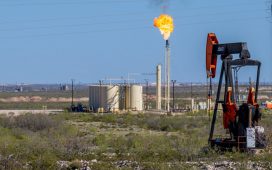With help from Josh Siegel, Alex Daugherty, Alex Guillén, Kelsey Tamborrino and Catherine Morehouse
Editor’s note: Morning Energy is a free version of POLITICO Pro Energy’s morning newsletter, which is delivered to our subscribers each morning at 6 a.m. The POLITICO Pro platform combines the news you need with tools you can use to take action on the day’s biggest stories. Act on the news with POLITICO Pro.
— The SEC’s latest proposals on climate transparency target companies who greenwash their environmental, social and governance credentials, in a nod to demands for truly sustainable investment opportunities.
— A California court considers a case with major implications for oil extraction in the state today.
— FEMA’s flood programs have a demonstrated pattern of unequal resource distribution, with rich, white areas disproportionately reaping the benefits.
HAPPY THURSDAY! I’m your host, Matthew Choi. Congrats to Bracewell’s Frank Maisano for knowing Madonna’s paternal grandparents came from Pacentro, Italy. For today’s trivia: What is Canada’s largest island? Send your tips and trivia answers to [email protected]. Find me on Twitter @matthewchoi2018.
Check out the POLITICO Energy podcast — all the energy and environmental politics and policy news you need to start your day, in just five minutes. Listen and subscribe for free at politico.com/energy-podcast. On today’s episode: A final blow to Pebble Mine?
STOPPING THE GREEN SPIN: Investment funds could face stricter branding rules concerning their environmental, social and governance activities if two Securities and Exchange Commission proposals get adopted, POLITICO’s Lorraine Woellert reports. The Commission voted Wednesday on party lines to advance two proposals limiting ESG labeling to offerings that meet stricter disclosure requirements and broadening the agency’s names rule, which bars companies from adding misleading titles to mutual funds and other investments. Funds that market themselves with environmental goals would have to disclose the greenhouse gas emissions associated with their portfolios.
The moves aim to rein in greenwashing, with SEC Chair Gary Gensler telling reporters: “Investors could benefit from better understanding what stands behind the names.”
The growing concern among investors about environmental sustainability, both on an ethical and financial level, was on display during Exxon Mobil’s shareholders meeting Wednesday, where 52 percent of voting Exxon investors supported a resolution requiring a climate “stress test” on how the company would weather government policies bringing greenhouse gas emissions to net zero by 2050, POLITICO’s Ben Lefebvre reports.
That’s growth from last year when a similar proposal garnered 49 percent of the vote. The company’s chief executive, Darren Woods, discouraged shareholders from voting for the proposal, introduced by Christian Brothers Investment Services. John Geissinger, chief investment officer of the firm, contended there is growing desire for transparency on how moves to lower emissions would impact business.
“This is no fringe element,” Geissinger said. “Yet you have not quantified the impairment of existing assets, the remaining lives of assets, the effects on liabilities, the change in capital expenditures that would be required under the scenario.”
THE KERN COUNTY CASE: The fate of a majority of California’s oil drilling will be the subject of a state court hearing today, with environmentalists challenging Kern County’s environmental review on oil projects in its boundaries, POLITICO’s Colby Bermel reports. The county contains 80 percent of California’s oil production and has sought to make itself the lead on environmental reviews on the industry within its borders rather than the state government. But environmentalists contend doing so violates state law.
The county has had some influential forces backing it, including the Western States Petroleum Association. Today’s hearing likely won’t result in a decision, but the case could have a major hand in California Gov. Gavin Newsom’s goal of phasing out all oil extraction by 2045. Read more from Colby here.
PUT UP OR SHUT UP: Sen. Joe Manchin’s bipartisan talks around bolstering U.S. energy security and combating climate change have reached a decisive moment. It’s put up or shut up time for participants — namely Manchin — to decide if there’s any deal to be had, participating senators acknowledged after emerging from their fifth meeting Wednesday night without progress towards actual written legislation.
“We have some tight windows we have to work in,” Manchin told reporters, including POLITICO’s Josh Siegel and Kelsey Tamborrino. “We’ve got to make some decisions here. Everyone has all the information.”
The latest meeting comes in a crucial work week before the Senate takes off for the Memorial Day recess on Thursday, a self-imposed deadline some Democrats had set to reach a handshake agreement with Manchin on a party-line reconciliation deal. With that looking unlikely, Manchin is under “pressure” to start showing whether his bipartisan discussions will show results — or if not, to proceed with Democrats on a reconciliation bill — according to Kevin Cramer (R-N.D.), a key negotiator in the group.
Manchin, however, would not commit to passing a package of clean energy tax credits as part of a party-line reconciliation bill if Republicans decline to support the credits.
As Josh and Kelsey previously reported, the bipartisan energy meetings so far have been informational, intended to get a better grasp on the clean energy tax credits that lawmakers already passed in the House as part of the Build Back Better Act, along with discussing other ideas such as streamlining permitting laws, boosting critical minerals mining, and imposing a carbon border adjustment. While several provisions broadly have some bipartisan support, it’s very uncertain whether incentives will align for Republicans and Democrats to pass major legislation in an election year.
“We are not at the point of having a bill and the question is whether we will ever have a bill or whether instead there will be a move through reconciliation for those items the Democrats agree on,” said Sen. Mitt Romney (R-Utah).
GOUGING BILL DEADLOCKED BUT NOT DEAD: The Senate Commerce Committee voted 14-14 along party lines on Democrats’ bill, S. 4217 (117), to expand the Federal Trade Commission’s investigative power over large oil companies. The measure is similar to a bill, H.R. 7688 (117), that passed the House of Representatives last week. Because of the tie committee vote, a senator must now move to discharge the bill from committee to call it up on the floor. But universal GOP opposition means it will not garner enough votes to overcome a filibuster.
“For decades when gas prices have spiked the FTC has been asked to identify price gouging and manipulation in the oil and gas market and each time the FTC has found nothing,” Commerce Committee ranking member Roger Wicker (R-Miss.) said. “The president is looking for a scapegoat, this bill would do just that.”
OUT OF ORDER: Republicans on the committee tried to offer amendments to the bill with the intention of increasing oil production, but Chair Maria Cantwell ruled all but one of them out of order. The lone amendment that was accepted by voice vote from Sen. Rick Scott (R-Fla.) would require the FTC to submit a report on enforcement actions the agency previously made on market manipulation.
One withdrawn amendment from Sen. John Hickenlooper (D-Colo.) would have required the president to refill the Strategic Petroleum Reserve with American oil when the price of oil drops below $70 per barrel. Cantwell said any amendments dealing with energy production should be considered by the Energy Committee.
“We are going to continue on what is the jurisdiction of this committee,” Cantwell said.
GOFFMAN TOUTS CLIMATE ‘OPTIONS’ ONCE SCOTUS RULES: EPA has prepared multiple options for crafting a new power plant carbon rule once the Supreme Court issues its big ruling on that subject in the next month or so, EPA air nominee Joe Goffman told the Environment and Public Works Committee on Wednesday.
“We have identified different options for responding depending on what the Supreme Court tells us the nature and contours of our authority are,” he said during his confirmation hearing. He also said EPA will conduct another round of outreach once the Supreme Court rules.
SREiously: Goffman also told senators EPA will soon make a decision on pending small refinery exemption applications. He said the agency is hoping to make “clear once and for all” what the law is regarding the exemptions under the Renewable Fuel Standard and its analysis of the impact the program has on fuel markets to provide certainty going forward under the program. Goffman added that he did not believe the agency’s actions on small refineries will make gas prices worse for drivers.
Bridger on the River Comply: Goffman also indicated closed-door negotiations over haze rule requirements for Wyoming are close to wrapping up, with the state expected to submit a revised implementation plan soon. Republican Sen. Cynthia Lummis has placed a hold on most EPA nominees until there’s an agreement about the future of the Jim Bridger power plant, which plans to convert from coal to natural gas.
FREY CONFIRMED: Chris Frey, nominee to lead EPA’s research and development wing, got confirmed by the full Senate on Wednesday after months of waiting. The Senate Environment and Public Works Committee advanced his nomination last year and again this year. Read more from POLITICO’s Alex Guillén.
IN COMMITTEE TODAY: The House Homeland Security Transportation Security Subcommittee has a hearing today on the state of the Transportation Security Administration. TSA’s role in safeguarding the country’s pipelines fell under added scrutiny after last year’s Colonial Pipeline hack.
FEMA’S FLOOD INEQUALITY: In case you missed it, E&E News’ Thomas Frank spent months poring through FEMA data and found a disturbing trend of the agency systemically benefitting richer, white areas to help lift homes out of flood areas.
In 12 of the 18 states examined, more than half of the FEMA elevation money has gone to communities that are overwhelmingly white or wealthy. And in four states — Kentucky, Massachusetts, Ohio and West Virginia — more than 75 percent of the FEMA elevation money has gone to overwhelmingly white or wealthy communities.
FEMA’s Acting Associate Administrator for Resilience David Maurstad didn’t deny Thomas’ reporting, and the agency acknowledged it has equity issues in its flood programs.
“Do we need to see different outcomes? I think the answer is yes,” Maurstad said. “That’s why we’re looking at the programs to determine what we can do to reduce the barriers for homeowners in disadvantaged areas.”
Take some time to read the full report here.
ME FIRST: DERAILING LNG: A cohort of prominent environmental groups is launching a campaign today to stop the transit of liquefied natural gas by rail. The groups, which include the Natural Resources Defense Council, Greenpeace USA, Food & Water Watch and Frack Action, are making a direct appeal to Transportation Secretary Pete Buttigieg through social media, videos and a petition. LNG transit by rail previously required special permitting, but those requirements were gutted under the Trump administration.
With Europe looking for alternative supplies of natural gas following the Russian invasion of Ukraine, the Biden administration pledged to find at least 15 billion cubic meters of LNG for the EU to offset Russian imports this year. While the administration didn’t commit to the U.S. producing all that LNG, it is the world’s biggest natural gas producer, and fossil-friendly lawmakers have seized on the commitment to expand the country’s transit capacity, particularly with new pipelines. A spate of court rulings remanding permits for natural gas pipelines back to FERC on environmental concerns gives ground to look for alternative transit means. But the groups say rail transit is environmentally dangerous, especially with rail lines passing through residential areas.
“Banning LNG by rail is Secretary Buttigieg’s first major climate test, and the environmental community is looking to him to lead,” the groups write in a news release today.
PIPELINE DÉJÀ VU: Industry stakeholders weighed in — again — on FERC’s controversial pipeline policies that were reverted to draft statements in March.
The gas industry reiterated its arguments Wednesday in comments submitted to FERC that the commission’s initial proposal exceeded its authority, and urged regulators to scale back its proposal to limit climate considerations and provide more flexibility to the industry. Electric utility Duke Energy argued further that smoothing the pipeline permitting policy will enable the power sector to decarbonize faster by giving utilities better access to natural gas so they can shift from coal to gas — and eventually use those pipelines for “clean hydrogen.”
But environmental and consumer groups urged FERC to put an end to decades of “rubber stamping” at the commission, and cited the several federal court orders that have called on the agency to more thoroughly consider climate and environmental justice when assessing a project. Advocates further argue that the status quo has not worked, citing a University of Hawaii study that finds the U.S. has built more gas infrastructure than needed — amounting to roughly $179 billion in excess investment.
— ”Iran Used Secret U.N. Records to Evade Nuclear Probes,” via The Wall Street Journal.
— ”EPA moves again to prohibit mining in Alaska’s Bristol Bay region,” via POLITICO.
— ”Biden officials in Saudi Arabia for talks on oil, planned visit,” via Axios.
— “Russia and Iran discuss swapping supplies for oil and gas, goods logistics,” via Reuters.
— “California, Long Leery of Nuclear Power, Joins Bid to Save It,” via Bloomberg.
— “Australians voted for stronger action on climate change. Will they get it?” via CNN.
THAT’S ALL FOR ME!









